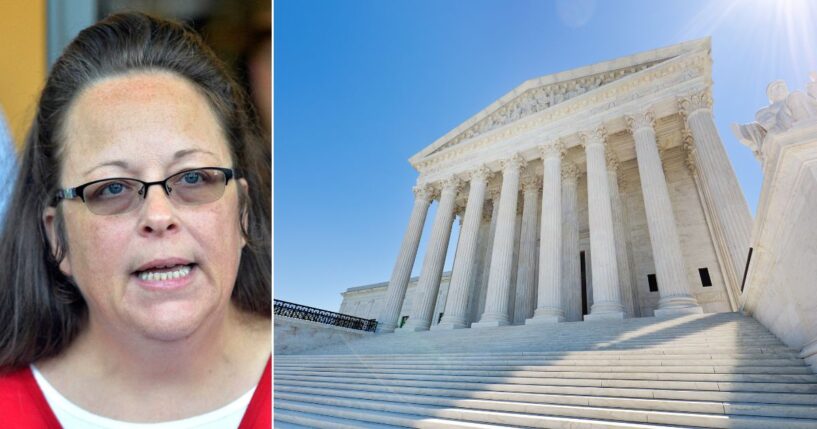Nearly a decade after the U.S. Supreme Court legalized same-sex marriage in Obergefell v. Hodges, the nation’s highest court may soon revisit the decision that redefined marriage law in America. The case arises from a renewed appeal by former Kentucky county clerk Kim Davis, whose defiance of the 2015 ruling made her a national flashpoint in the debate over religious liberty and LGBTQ rights.
Davis, who was jailed for five days in 2015 after refusing to issue marriage licenses to same-sex couples, is now petitioning the Supreme Court to overturn Obergefell entirely. Her case, Davis v. Ermold, challenges the constitutional foundation of same-sex marriage and asserts that the ruling forced her to choose between her deeply held religious beliefs and her public duties.
“If ever there was a case of exceptional importance, the first individual in the Republic’s history who was jailed for following her religious convictions regarding the historic definition of marriage, this should be it,” Davis wrote in her appeal.
Following years of litigation, Davis was ordered to pay $50,000 in damages to a couple she denied a marriage license. Her appeal was rejected by the U.S. Court of Appeals for the 6th Circuit, prompting her to take her case once again to the Supreme Court. According to SCOTUSblog, the justices are set to consider her petition on November 7. As is customary, the Court may deliberate over multiple conferences before deciding whether to hear the case. If it declines, that decision could be announced as early as November 10.
At the heart of Davis’s argument is her claim that Obergefell was wrongly decided and that its recognition of a constitutional right to same-sex marriage “had no basis in the Constitution.” She contends the ruling infringed on the First Amendment rights of Americans whose faith defines marriage as between one man and one woman.
The couple who sued Davis, however, has urged the Court not to revisit the matter, arguing that her case offers no new legal grounds to overturn precedent.
Whether the justices agree to hear Davis’s appeal will depend on at least four votes in favor of review — and likely confidence that a fifth justice would side with overturning Obergefell.
Among the current members of the Court, Chief Justice John Roberts and Justices Clarence Thomas and Samuel Alito dissented from the 2015 decision, while Justices Sonia Sotomayor and Elena Kagan were part of the majority that established same-sex marriage as a constitutional right. Justice Amy Coney Barrett, appointed in 2020, has previously signaled disapproval of the Obergefell ruling.
This is not the first time Davis has sought the Court’s intervention. In 2020, the justices declined to hear her appeal. However, Thomas and Alito issued a sharply worded statement condemning the 2015 ruling, warning that it had enabled governments to “brand religious adherents who believe that marriage is between one man and one woman as bigots.”
“Davis may have been one of the first victims of this Court’s cavalier treatment of religion in its Obergefell decision,” they wrote. The justices did not call for reconsideration at the time but cautioned that Obergefell had created “a problem that only [the Court] can fix.”
“Until then,” they concluded, “Obergefell will continue to have ruinous consequences for religious liberty.”
Now, with a more conservative bench and multiple challenges to social precedents pending, Davis’s case could provide the Court an opportunity to reopen one of the most consequential civil rights rulings of the 21st century.

